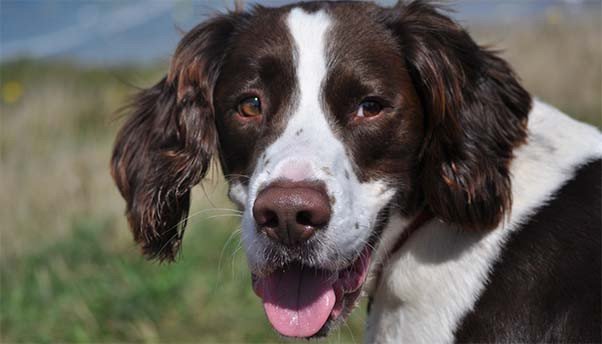You Can Teach An Old Dog New Tricks!

The needs of a senior dog.
Many pet foods carry the life stage term Senior, indicating that older dogs require a different set of nutrients to younger dogs or perhaps extra nutrients.
The truth is a fresh, wholefood diet already carries the additions added to a dry or tinned diet labelled Senior. Joint support additions such as Glucosamine or Chondroitin are abundant in raw meaty bones and in the blended minces containing bone.
The anti-inflammatory properties found in fresh, wholefoods such as omega 3 and further essentially fatty acids, also play a big role in health throughout a dog’s life, and should be included at all stages of life, rather than simply added in those latter years by feeding a senior food.
For the majority of older dogs, you can simply feed them exactly the same nourishing fresh raw meals as a younger adult dog. Feeding them is easier than you might think.
Simply avoiding the tougher, harder marrow or knuckle bones means your senior dog can still enjoy the benefits of chewing raw meaty bones too.
Fussy older dogs
True considerations of senior dogs are found more in the common change of appetite. Often a senior dog can become fussy, perhaps losing their sense of smell or experiencing gut biome changes. Our nutritionist shares that often simply by adding our delicious bone broth you can tempt an older dog to enjoy meal times again. Bone Broth can be lightly heated too, bringing out the flavours and ensuring every morsel is tasty. Bone Broth is wonderful for gut health too, soothing and promoting beneficial probiotics.
Tripe can also be worth adding if your senior dog has not tried Tripe before. Most dogs really enjoy the smell of tripe and can be tempted to eat well again.
Could an older dog need less food?
Absolutely, it all depends on their activity levels. When feeding a fresh food diet, it is safe to adjust the amount your dog needs. Our feeding calculator is based on 2% which work for medium sized dogs. If your senior dog is more sedentary try reducing the % by .5% for bigger or medium sized dogs, and as much as 1% for smaller dogs under 8kg.
What about less protein?
It is, however, a myth that dogs need less protein as they age. This myth stems from the common diagnosis of kidney issues that many senior dogs fed a dry or tinned diet experience. When you feed a moisture rich raw diet your dog is far less likely to find their kidneys at strain, or to develop kidney issues at all.
We have included some great research papers below highlighting the need for protein even if a senior dog does have kidney issues diagnosis.
You are also very welcome to discuss your dog’s diet with us anytime to make sure you are feeding them the most appropriate diet for their condition.
My senior dog has a sensitive stomach; should I switch them?
Absolutely! As explained in our sensitive stomach blog, https://thefarmersdog.uk/blogs/guides-and-advice/helping-a-dog-with-a-sensitive-stomach, a dog’s stomach is designed for the digestion of fresh, wholefoods and actually functions better digesting them than it does trying to digest processed foods.
It is also a consideration to provide a lightly oven cooked dish of The Farmer’s Dog Beef mince (do not cook our other minces as they contain bone) just for a few days to slowly introduce fresh, wholefoods back into your dog’s diet plan.
We offer a great complete and balanced recipe using The Farmer's Dog beef mince here: https://thefarmersdog.uk/blogs/guides-and-advice/balanced-beef-recipe












